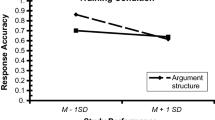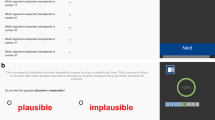Abstract
In this article we present a training program based on the empirical research conducted in the project 'argumentational integrity'. After a brief sketch of the problem dimensions concerning unfair argumentation we give an overview of the training concept and the underlying empirical research. Exemplification of the instructional design is given for the second and the fifth training dimension (standards of argumentational integrity and reactions to unfair contributions). Finally we indicate how the training is to be evaluated and present initial results demonstrating that in comparison with an untrained control group participants in the training significantly improve their skills in identifying and naming argumentative rule violations.
Similar content being viewed by others
REFERENCES
Apel, K.-O.: 1976, 'Sprechakttheorie und transzendentale Sprachpragmatik', in K.-O. Apel (eds.), Sprachpragmatik und Philosophie, Suhrkamp, Frankfurt, 10–173.
Arvey, R. D., Cole, D. A., Fisher Hazucha, J., and Hartanto, F. M.: 1985, 'Statistical Power of Training Evaluation Designs', Personnel Psychology 38, 493–507.
Ausubel, D. P.: 1963, The Psychology of Meaningful Verbal Learning: An Introduction to School Learning, Grune and Stratton, New York.
Blickle, G.: 1994, Kommunikationsethik im Management, Argumentationsintegrität als personal-und organisationspsychologisches Leitkonzept, Metzler und Poeschel, Stuttgart.
Brinker, K.: 1996, 'Normen des Diskutierens und ihre Markierung in Fernsehdiskussionen.-Ein gesprächsanalytischer Beitrag', in A. Peyer und P. R. Portmann (eds.), Norm, Moral und Didaktik – die Linguistik und ihre Schmuddelkinder: eine Aufforderung zur Diskussion, Niemeyer, Tübingen, 115–131.
Christmann, U. und Groeben, N.: 1993, Argumentationsintegrität (XIV): Der Einfluß von Valenz und Sequenzstruktur argumentativer Unintegrität auf kognitive und emotionale Komponenten von Diagnose-und Bewertungsreaktionen (Arbeiten aus dem Sonderforschungsbereich 245 'sprache und Situation', Bericht Nr. 67), Heidelberg/Mannheim.
Christmann, U. and Groeben, N.: 1995, 'Diagnosis and Evaluation of Violations of Argumentational Integrity: An Empirical Study', in F. H. van Eemeren, R. Grootendorst, A. J. Blair and C. A. Willard (eds.), Proceedings of the Third ISSA Conference on Argumentation, Amsterdam 1994, Vol III, Sic Sat, Amsterdam, 219–229.
Christmann, U., Groeben, N. und Küppers, A.: 1993, Argumentationsintegraität (XIII). Subjektive Theorien über Erkennen und Ansprechen von Unintegritäten im Argumentationsverlauf (Arbeiten aus dem Sonderforschungsbereich 245 'sprache und Situation', Bericht Nr. 66), Heidelberg/Mannheim.
Christmann, U., Schreier, M. und Groeben, N.: 1996, 'War das Absicht? Indikatoren subjektiver Intentionalitätszustände bei der ethischen Bewertung von Argumentationsbeiträgen', Linguistik und Literaturwissenschaft 101 (Themenheft Sprache und Subjektivität I), 70–113.
Christmann, U., Sladek, U. und Groeben, N.: 1998, 'Der Einfluß personaler und interaktiver Kontextinformationen auf die Diagnose und Bewertung argumentativer (Un-)Integrität', Sprache und Kognition 17(3), 107–124.
Christmann, U., Mischo, Ch. and Groeben, N.: in press, 'Components of the Evaluation of Integrity Violations in Argumentative Discussion: Relevant Factors and Their Relationships', Journal of Language and Social Psychology.
Cohen, J.: 1977, Statistical Power Analysis for the Behavioral Sciences, Academic Press, New York.
Collins, A., Brown, J. S. and Newman, S. E.: 1987, 'Cognitive Apprenticeship: Teaching the Crafts of Reading, Writing, and Mathematics', in L. B. Resnick (ed.), Knowing, Learning and Instruction. Essays in the Honour of Robert Glaser, Erlbaum, Hillsdale, NJ.
Darley, J. M. and Shultz, T. R.: 1990, 'Moral Rules: Their Content and Acquisition', Annual Review of Psychology 41, 525–556.
Eemeren, F. v. and Grootendorst, R.: 1984, Speech Acts in Argumentative Discussions. A Theoretical Model for the Analysis of Discussions Directed Towards Problem Solving Conflicts of Opinion, Foris Publication, Dordrecht.
Eemeren, F. v. and Grootendorst, R.: 1991, 'A Pragma-dialectical Perspective on Norms', Communication and Cognition 24(1), 25–42.
Eemeren, F. v. and Grootendorst, R. and Kruiger, T.: 1987, Handbook of Argumentation Theory. A Critical Survey of Classical Backgrounds and Modern Study, Foris Publication, Dordrecht.
Eemeren, F. v. and Grootendorst, R. and Snoeck Henkemans, F.: 1996, Fundamentals of Argumentation Theory, Erlbaum, Mahwah, NJ.
Eisenhardt, K. M.: 1990, 'Speed and Strategic Choice: How Managers Accelerate Decision Making' California Management Review 32, 39–54.
Flender, J., Christmann, U. und Groeben, N.: 2000, 'Entwicklung und erste Validierung einer Skala zur Erfassung der passiven argumentativ-rhetorischen Kompetenz', Zeitschrift für Differentielle und Diagnostische Psychologie 20(4), 309–325.
Frixen, G.: 1987, 'Struktur und Dynamik natürlichsprachlichen Argumentierens', Papiere zur Linguistik 36(1), 45–96.
Gage, N. L. and Berliner, D. C.: 1986, Pädagogische Psychologie, 4th edition, Psychologie Verlags Union, Weinheim.
Gatzemeier, M.: 1975, 'Grundsätzliche Ñberlegungen zur rationalen Argumentation (mit Bezug auf den schulischen Unterricht)', in R. Künzli (ed.), Curriculumentwicklung, Kösel, München, 147–158.
Geißner, H.: 1985, 'Mit Gründen streiten (Argumentationspraxis)', Diskussion Deutsch 16(82), 140–151.
Gerstenmaier, J. und Mandl, H.: 1995, 'Wissenserwerb unter konstruktivistischer Perspektive', Zeitschrift für Pädagogik 41, 867–887.
Groeben, N., Nüse, R. und Gauler, E.: 1992, 'Diagnose argumentativer Unintegrität. Objektive und subjektive Tatbestandsmerkmale bei Werturteilen über argumentative Sprechhandlungen', Zeitschrift für experimentelle und angewandte Psychologie 39(4), 533–558.
Groeben, N., Schreier, M. and Christmann, U.: 1993, 'Fairness beim Argumentieren: Argumentationsintegrität als Wertkonzept einer Ethik der Kommunikation', Linguistische Berichte 147, 355–382.
Habermas, J.: 1976, 'Was heißt Universalpragmatik?', in K.-O. Apel (ed.), Theorie-Diskussion Sprachpragmatik und Philosophie Suhrkamp, Frankfurt/M., 174–272.
Habermas, J.: 1984, Vorstudien und Ergänzungen zur Theorie des kommunikativen Handelns, Suhrkamp, Frankfurt/M.
Habermas, J.: 1983, Moralbewußtsein und kommunikatives Handeln, Suhrkamp, Frankfurt.
Habermas, J.: 1991, Erläuterungen zur Diskursethik, Suhrkamp, Frankfurt.
Hermann, G.: 1973, 'Lernen durch Entdeckung: Eine kritische Erörterung von Forschungsarbeiten', in H. Neber (ed.), Entdeckendes Lernen, Beltz Weinheim.
Kipnis, D. and Schmidt, S. M.: 1988, 'Upwoard-influence Styles: Relationship with Performance Evaluations, Salary, and Stress', Administrative Science Quarterly 33, 528–542.
Klein, W.: 1980, 'Argumentation und Argument', Zeitschrift für Literaturwissenschaft und Linguistik 38/39, 9–57.
Klein, W.: 1981, 'Logik der Argumentation', in P. Schröder und H. Steger (eds.), Dialogforschung, Jahrbuch 1980 des Instituts für Deutsche Sprache, Vol. 54, Schwann, Düsseldorf, 226–264.
Kopperschmidt, J.: 1973, Rhetorik, Kohlhammer, Stuttgart.
Kopperschmidt, J.: 1989, Methodik der Argumentationsanalyse, Formmann-Holzboog, Stuttgart.
Mummendey, A., Linneweber, V. and Löschper, G.: 1984, 'Aggression: from Act to Interaction', in A. Mummendey (ed.), Social Psychology of Aggression, Springer, Berlin, 69–106.
Naess, A.: 1966, Communication and Argument, Elements of Applied Semantics, Allen and Unwin, London.
Naess, A.: 1975, Kommunikation und Argumentation, Scriptor, Kronberg/Ts.
Nogami, G. Y. and Streufert, S.: 1983, 'The Dimensionality of Attributions of Causality and Responsibility for an Accident', European Journal of Social Psychology 13, 433–436.
Nüse, R., Groeben, N., Christmann, U. und Gauler, E.: 1993, 'Schuldmindernde versus – begründende Zusatzattributionen in moralischen Handlungsbeurteilungen', Gruppendynamik 24(2), 165–198.
Pander Maat, H.: 1985, 'Argumentation: Zur Charakterisierung und Abgrenzung eines Forschungsgegenstands', Studium Linguistik 6, 1–20.
Perelman, Ch.: 1979, Logik und Argumentation, Athenäum, Königstein/Ts.
Rind, B., Jaeger, M. and Strohmetz, D. B.: 1995, 'Effect of Crime Seriousness on Simulated Jurors' Use of Inadmissible Evidence', Journal of Social Psychology 135(4), 417–424.
Schönke, A. and Schröder, H. et al.: 1985, StGB, Kommentar (22nd ed.) (Commentary to the German Criminal Code), Beck, München.
Schreier, M.: 1997, Das Erkennen sprachlicher Täuschung, Aschendorff, Münster.
Schreier, M.: 1992, Rhetorische Strategien und Integritätsstandards: Zur Relation von Rhetorik, Dialektik und Argumentationsintegrität, Unveröffentl. Diplom-Arbeit, Psychologisches Institut der Universität, Heidelberg.
Schreier, M. and Groeben, N.: 1990, Argumentationsintegrität III: Rhetorische Strategien und Integritätsstandards (Arbeiten aus dem Sonderforschungsbereich 245 'sprache und Situation', Bericht Nr. 30), Heidelberg/Mannheim.
Schreier, M. and Groeben, N.: 1995, 'Unfairness in Argumentative Discussions: Relevant Factors and Prototypical Manifestations in Spoken Language', in F. H. van Eemeren, R. Grootendorst, A. J. Blair and C. A. Willard (eds.), Proceedings of the Third ISSA Conference on Argumentation Amsterdam 1994, Vol III, Sic Sat, Amsterdam, 276–286.
Schreier, M. and Groeben, N.: 1996, 'Ethical Guidelines for the Conduct in Argumentative Discussions: An Exploratory Study', Human Relations 49(1), 123–132.
Schreier, M., Groeben, N. und Mlynski, G.: 1994, Argumentationsintegraität (XV): Der Einfluß von Valenz, Indikatoren subjektiver Tatbestandsmäßigkeit, (Un-)Höflichkeit auf die Diagnose und Thematisierung argumentativer Unintegrität, (Arbeiten aus dem Sonderforschungsbereich 245 'sprache und Situation', Bericht Nr. 68), Heidelberg/Mannheim.
Schreier, M., Groeben, N. and Blickle, G.: 1995, 'The Effects of (un-)fairness and (im-)politeness on the Evaluation of Argumentative Communication', Journal of Language and Social Psychology 14(3), 260–288.
Schreier, M., Groeben, N. and Christmann, U.: 1995, 'That's Not Fair: Argumentational Integrity as an Ethics of Argumentative Communication',Argumentation 9, 267–289.
Schreier, M., Groeben, N., Christmann, U., Nüse, R. and Gauler, E.: 1993, 'Indicators of Argumentational Integrity in Everyday Communication', Argumentation 7, 205–219.
Schulz, W.: 1965, 'Unterricht: Analyse und Planung', in P. Heimann, G. Otto und W. Schulz (eds.), Unterricht: Analyse und Planung, Schroedel, Hannover.
Schulz, W.: 1981, Unterrichtsplanung, 3rd edition, Urban und Schwarzenberg, München.
Schulz, W.: 1996, Anstiftung zum didaktischen Denken: Unterricht, Didaktik, Bildung, Beltz, Weinheim.
Seifert, J. W.: 1993, Visualisieren, Präsentieren, Moderieren, 5th edition, Gabal, Speyer.
Shaver, K. G.: 1985, The Attribution of Blame, Springer, New York, Heidelberg.
Shultz, T. R. and Schleifer, M.: 1983, 'Towards a Refinement of Attribution Concepts', in J. Jaspars, F. D. Fincham and M. Hewstone (eds.), Attribution Theory and Research: Conceptual, Developmental and Social Dimensions, Academic Press, London, 37–62.
Spiro, R. J., Feltovich, P. J., Jacobson, M. J. and Coulson, R. L.: 1991, 'Cognitive Flexibility, Constructivism, and Hypertext: Random Access Instruction for Advanced Knowledge Acquisition in Ill-structured Domains', Educational Technology 31, 24–33.
Tjosvold, D. and Deemer, D. K.: 1980, 'Effects of Controversy within a Cooperative or Competitive Context on Organizational Decision Making', Journal of Applied Psychology 65, 590–595.
Völzing, P. L.: 1979, Begründen, Erklären, Argumentieren, Quelle und Meyer, Heidelberg.
Walton, D. N.: 1996, Fallacies Arising from Ambiguity, Kluwer, Dordrecht.
Walton, D. C. and Krabbe, E. C. W.: 1995, Commitment in Dialogue, Basic Concepts of Interpersonal Reasoning, State University of New York Press, Albany.
Weiner, B.: 1995, Judgments of Responsibility: A Foundation for a Theory of Social Conduct, Guilford Press, New York.
Author information
Authors and Affiliations
Rights and permissions
About this article
Cite this article
Christmann, U., Mischo, C. & Flender, J. Argumentational Integrity: A Training Program for Dealing with Unfair Argumentative Contributions. Argumentation 14, 339–360 (2000). https://doi.org/10.1023/A:1007889322192
Issue Date:
DOI: https://doi.org/10.1023/A:1007889322192




